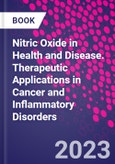Approx.326 pages
Please Note: This is an On Demand product, delivery may take up to 11 working days after payment has been received.
Table of Contents
Section 1: General properties of NO/metabolites in human diseasesSection 2: Development of novel NO donors/inhibitors and NO complexes: properties, cell signaling, synergy Section 3: Pharmacokinetics of NO donors/inhibitors in animal models and toxicities Section 4: Red-Ox signaling and modification of proteins. Characterization of their modified functions Section 5: Therapeutic applications of NO donors/inhibitors in non-cancer related human diseases Section 6: Therapeutic applications of NO donors/inhibitors in various cancersConcluding remarks and future perspectivesAuthors
Lucia Morbidelli Professor, Department of Life Sciences, University of Siena, Siena, Italy. Dr. Morbidelli's experience is within the molecular and biochemical pharmacology of angiogenesis and microcirculation and its biological application in diseases and cancer. Through of a plethora of in vitro and in vivo models, she has contributed to the characterization of the pro- and antiangiogenic activities of designed synthetic molecules and natural products and their potential applications in angiogenesis-dependent diseases of the cardiovascular system, ocular disorders, neurovascular diseases and cancer. She co-organized with Professor Bonavida the Fourth International Workshop on "Nitric Oxide in Cancer� held in Sevilla in March 13-14, 2015. The meeting addressed different topics such as NO, mutagenesis, carcinogenesis, tumor promotion and tumor growth; NO regulation of cell death pathways; NO and proliferation and epithelial-mesenchymal transition; Regulation of immune response by NO; Antitumoral activity of NO-based releasing strategies: pre-clinical studies; Antitumoral activity of NO-based releasing strategies: clinical trials. Benjamin Bonavida Distinguished Research Professor, Department of Microbiology, Immunology and Molecular Genetics, David Ge? en School of Medicine, Jonsson Comprehensive Cancer Center, University of California at Los Angeles, California, USA. Dr. Benjamin Bonavida is currently a Distinguished Research Professor at the University of California, Los Angeles (UCLA). He is affiliated with the Department of Microbiology, Immunology and Molecular Genetics, UCLA David Geffen School of Medicine, and the Jonsson Comprehensive Cancer Center at UCLA. His research career, thus far, has focused on investigations in the fields of basic immunochemistry and cancer immunobiology. His research investigations have ranged from the biochemical, molecular, and genetic mechanisms of cell-mediated killing and tumor cell resistance to chemo-immuno cytotoxic drugs. The reversal of tumor cell resistance was investigated by the use of various selected sensitizing agents based on molecular mechanisms of resistance. In these investigations, there was the newly characterized dysregulated NF-kB/ Snail/YY1/RKIP/PTEN loop in many cancers that was reported to regulate cell survival, proliferation, invasion, metastasis, and resistance. Emphasis was focused on the roles of the tumor suppressor Raf kinase inhibitor protein (RKIP) and the tumor promoter Yin Yang 1 (YY1) and the role of nitric oxide (NO) as a chemo-immuno-sensitizing factor. Many of the aforementioned studies are centered on the clinical challenging features of cancer patients' failure to respond to both conventional and targeted therapies.Dr. Bonavida has been active in the organization of regular sequential international miniconferences that are highly focused on the roles of YY1, RKIP, and nitric oxide in cancer and their potential therapeutic applications. Several books edited or coedited have been published. In addition, he is the Series Editor of books (over 20) published by Springer/Nature: Resistance to Anti-Cancer Targeted Therapeutics. In addition, he is presently the Series Editor of Three Series published by Elsevier/Academic Press on "Cancer Sensitizing Agents for Chemotherapy,� "Sensitizing Agents for Cancer Resistance to Cell Mediated Immunotherapy,� and "Breaking Tolerance to Anti-Cancer Antibody Immunotherapy.� He is the Editor-in-Chief of the Journal Critical Reviews in Oncogenesis, Editor-in-Chief of Onco Therapeutics, and Associate Editor of "Critical Reviews in Immunology.� Dr. Bonavida has published over 500 research publications and reviews in various scientific journals of high impact. Jordi Muntan� Dept Medical Physiology and Biophysics, Institute of Biomedicine of Seville (IBiS), Spain. Dr. Muntan�'s scientific career has been all devoted to the study of the relevance of oxidative and nitrosative stress in cell proliferation and death in different experimental models and clinical settings such as acute hepatocellular injury and hepatocarcinoma. The relevance of the temporal, dose and compartmentalization of nitric oxide (NO) release has been related to cytotoxicity, as well as the cytoprotective properties of classical antioxidants, prostanoids and alpha-tocopherol in different experimental models of liver injury. The anti-tumoral properties of NO has also been demonstrated using NO-donors and nitric oxide synthase type III (NOS3) overexpression in in vivo and in vitro models. The involvement of NO in the antitumoral properties of the molecular recommended therapies for patients with advanced hepatocarcinoma, such as the tyrosine kinase inhibitor Sorafenib, has also been studied comprehensively by Dr. Muntan�'s lab.








